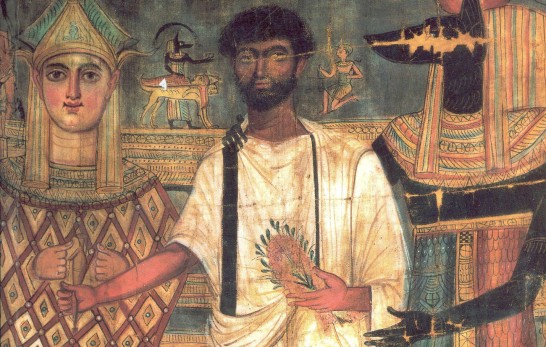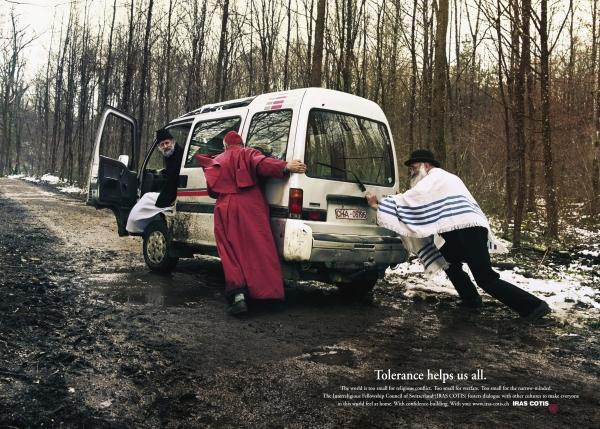I don’t have to tell you that we are living in divided times. I don’t have to tell you that we are living in intolerant times. I don’t even have to tell you that many people today think tolerance—political or religious—is a bad thing. Yet in my stubborn heart, I still believe it’s a virtue. Especially in a religious context, and even knowing all its attendant problems.
Yes. Religious tolerance is hard.
And it always has been. Even in a polytheistic world where people were used to dealing with a variety of religious expressions.
For instance, Greek comic playwrights often made fun of the religious practices of Egyptians, usually focusing on their reverence for animals as manifestations of the Divine. This 4th-century-BCE bit by Anaxandrides of Rhodes, who won many awards for his work, is an example. He writes as Demos (“the people”) to Egypt:
I couldn’t have myself allied with you. Our ways and customs differing as they do. I sacrifice to Gods; to bulls you kneel. Your greatest God’s our greatest treat: the eel. You don’t eat pork; it’s quite my favorite meat. You worship your dog, mine I always beat when he’s caught stealing. Priests stay whole with us; with you they’re gelded eunuchs. If poor puss appears in pain, you weep; I kill and skin her. To me, the mouse is nought, you see ‘power’ in her.
Some Egyptians, on the other hand, considered Greeks whipper-snapper-know-nothings when it came to religion and declared that anything that came out of a Greek mouth was just a lot of hot air.

Religious tolerance is hard precisely because our religion, our Deity or Deities, our practices, our beliefs and experiences are so close to our hearts. In many cases, they are cherished building blocks of our lives. If religion is central to our lives, it is also likely to be central to our self-definition. If someone attacks (or, in some cases, even questions) our religion, it seems they are attacking our core self. That not only hurts on a feeling level, it actually seems life-threatening. The chest tightens as the heart speeds up. Nerves jangle. The belly feels sick. Fight-or-flight kicks in—and we often find ourselves coming down on the side of fight. I know I’ve been there, too.
Yet, as far as I know, no wars were fought over Greek and Egyptian religious differences. The grandfather of Lycurgus (an Athenian politician from 338-326 BCE) may have been influential in bringing the Egyptian religion of Isis to Athens. Apparently his grandson suffered no discrimination on account of his family’s connection with Egyptian cult—apart from the jabs of the comics. Ancient priestesses and priests often simultaneously served very different Deities without betraying any of Them. The historian Herodotus was able to casually say that Isis “is called Demeter by the Greeks.”
That kind of syncretism, which happened to an astonishing degree with Isis, is one of the ways the ancient religion of Isis modeled religious tolerance. It wasn’t a matter of my-Goddess-is-better-than-your-Goddess; it was a translation of the Goddess from one culture to another. In the bustling world of the Mediterranean, people were used to translating languages. Why not translate Deities? And so they did. And so Isis became known as Isis Myrionymos, Isis of the Myriad Names. In Isis, with Her uncountable number of names, people could see THE Goddess—in all Her many expressions. Isiacism also modeled social tolerance in its acceptance of both women and men, rich and poor, slave and free. In late Isiacism, there was even a tradition of the freeing of slaves through a “sale” to Isis and Sarapis. Freedom and tolerance go hand-in-hand.
The modern Fellowship of Isis maintains this type of wide-open religious tolerance. All one must do is to be able to accept the organization’s Manifesto to become a member. To some, this tolerance may seem too chaotic, too accepting; yet it has enabled this modern group to survive for many years, even as it has suffered through the types of internal struggles to which all groups seem inevitably subject.
But how can we maintain the virtue of tolerance when faced with intolerance from others? What do we do when accused of “devil worship,” like the Isis devotees who were accused by some early Christians in Alexandria of worshipping “a dark, Egyptian devil?” How do we handle the current intolerance-based horrors throughout the world? Or, on a much less deadly, but often quite hurtful level, how do we navigate the Neopagan community’s current growing pains as groups of people seek to differentiate themselves from (though I would hope within) the greater community? I’ve been quite surprised at the lack of tolerance I’ve seen in some of these discussions. But I guess it gets back to that close-to-the-heart thing.
Oh, how I wish I had an answer.
Friends and I sometimes play a game in which we choose one thing to change about the world and discuss the implications of that change. True religious tolerance is the magical change of heart that I often wish upon the world. By no means would it solve the world’s problems (poverty, war), but it might just give us enough space to get our heads out of our asses above water long enough that we could at least start to solve them.
Religious tolerance isn’t easy. In some cases, it doesn’t even seem possible. But that doesn’t mean we give up. We take some deep breaths. We remember that Isis lives. We explain it; again. Sometimes we walk away from an un-winnable argument. And in the political part of our lives, we work for civil justice.







